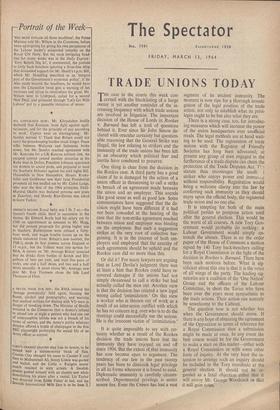TRADE UNIONS TODAY
rT'HE case in the courts this week con- 1 cerned with the blacklisting of a barge owner is yet another reminder of the in- creasing frequency with which trade unions are involved in litigation. The important decision of the House of Lords in Rookes v. Barnard has left a trail of questions behind it. Ever since Sir John Simon de- clared with oracular certainty but question- able reasoning that the General Strike was illegal, the law relating to strikers and the immunity of the trade unions has been left in an obscurity which political fear and inertia have combined to preserve.
One thing is clear from the decision in the Rookes case. A third party has a good claim if he is damaged by the action of a union officer in threatening to call a strike in breach of an agreement made between the union and an employer. This sounds like good sense as well as good law. Some commentators have suggested that the de- cision might have been different if it had not been conceded at the hearing of the case that the non-strike agreement reached between union and employer was binding on the employees. But such a suggestion strikes at the very root of collective bar- gaining. It is in the interest of both em- ployers and employed that the sanctity of such agreements should be upheld and the Rookes case did no more than this.
Or did it? For many lawyers are arguing that in Lord Devlin's judgment there was at least a hint that Rookes could have re- covered damages if the unions had not simply threatened to call a strike but had actually called the men out. Another view is that the decision has created a new legal wrong called 'intimidation.' On this view a worker who is thrown out of work as a result of an inter-union conflict with which he has no concern (e.g. over who is to do the riveting) could successfully sue the unions. He is the innocent victim of 'intimidation.'
It is quite impossible to say with cer- tainty whether as a result of the Rookes decision the trade unions have lost the immunity they have enjoyed on and off since 1906. But the extent of that immunity has now become open to argument. The tendency of our law in the past twenty years has been to diminish legal privilege in all its forms wherever it is found to exist. Diplomatic immunity is carefully circum- scribed. Departmental privilege is under severe fire. Even the Crown has lost a vast segment of its ancient immunity. The moment is now ripe for a thorough investi- gation of the legal position of the trade union, not only to establish what its privi- leges ought to be but also what they are. There is a strong case, too, for introduc- ing measures which will increase the power of the union headquarters over unofficial rivals. The legal methods are at hand wait- ing to be used. The registration of trade unions with the Registrar of Friendly Societies has long been advocated; at present any group of men engaged in the furtherance of a trade dispute can claim the protection of the Trade Disputes Act. T'- statute thus encourages the unofh striker who• enjoys power and immuinLy without responsibility. Registration would bring a welcome clarity into the law by conferring such immunity as they should enjoy upon the official body, the registered trade union and no one else.
It is tempting for both of the main political parties to postpone action until after the general election. This would be the worst of all courses. A new Tory Gov- ernment would probably do nothing : a Labour Government would simply en- trench the abuses. There is on the order paper of 'the House of Commons a motion signed by 140 Tory back-benchers calling for a Royal Commission in the light of the decision in Rookes v. Barnard. There have been such motions before. What is sig- nificant about this one is that it is the voice of all wings of the party. The leading sig- natories are a coalition of the 'One Nation' Group and the officers of the Labour Committee, in short the Tories who have been over the years most sympathetic to the trade unions. Their action can scarcely be unwelcome to the Cabinet.
The question now is not whether but when the Government should move. if there is any hope of obtaining the agreement of the Opposition to terms of reference for a Royal Commission then a submission might be made at once. In any event the best course would be for the Government to make a start on this matter—either with a Royal Commission or with some other form of inquiry. At the very least the in- tention to arrange such an inquiry should be included in the Tory manifesto at the general election. It should not be re- garded as a fatal objection either that it will annoy Mr. George Woodcock or that it will gain votes.


































 Previous page
Previous page